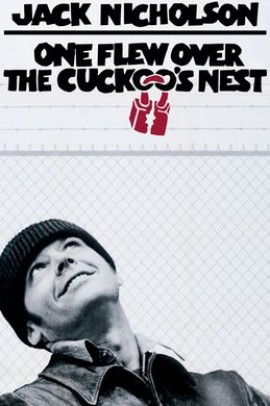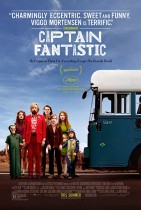One flew over the cuckoo’s nest (1975)
Synopsis
Reassigned to a mental institution after the prison system tires of his disobedience, McMurphy hopes to while away his sentence in a less taxing environment. Instead, he finds himself engaged in a battle of wits with the pitiless Nurse Ratched – who rules her patients with a cold-blooded zeal. Earning the respect and admiration of his downtrodden counterparts, McMurphy lights a fire in their hearts and stirs them to action– ensuring that none of their lives will ever be the same again.

| Genre | Drama |
| Production year | 1975 |
| Director | Milos Forman |
| Male actors | Jack Nicholson |
The Wild Man Cometh
by Kevin Latham
Bold, brash, scathing of authority but undeniably charming, director Milos Forman wastes no time in establishing McMurphy’s iconoclastic credentials. We are greeted by the sight of the antagonistic anti-hero as he’s escorted into a psychiatrist’s office for assessment – his prison warders having concluded that his rebellious behaviour qualifies him to spend time at this secure mental institution.
Pressed upon why he believes he’s been sent to the doctor, McMurphy makes it clear that he sees no logic in the decision – beyond the fact that he is proudly and patently difficult to control:
“Well, as near as I can figure out it’s ’cause I fight and fuck too much – and now they’re telling me that I’m crazy over here because I don’t sit there like a goddamned vegetable. Don’t make a bit of sense to me”.
This exchange sets the stage for the entire movie (in addition to foreshadowing its tragic climax) – as it quickly becomes clear that far from being psychologically imbalanced, the magnificent McMurphy has a keen and able mind – he simply refuses to curb its roguish inclinations to suit the conventions of society.
As a fiercely independent character, he directs his own gifts and attributes with authority, fights to assert his boundaries, uses his mental faculties to extremely creative effect, and is plainly a very sensual and sexual man – making him a potent vessel for the four primary masculine archetypes – King, Warrior, Magician and Lover. Most prominently, however, he epitomises the Wild Man, Rebel and Trickster archetypal energies, which ensures that he is always at odds with accepted social norms.
Watching McMurphy seize life in this spirit, we see how liberating these traits can be (which is ironic, given that he is incarcerated for them) and also can’t help to notice how substantially they have been curtailed within our culture. Take, for instance, the way that Nicholson’s surly champ relates to his fellow patients – particularly his soon-to-be bosom buddy – the gigantic Native American he nicknames ‘Chief’.
Superficially, his behaviour towards the other residents could easily be construed as bullying. He often baits, insults and dominates them physically – and in today’s hypersensitive social environment, the manner in which he communicates with his ‘Indian’ friend would certainly be decried by many as racist. What these scenes teach us, however, is that when it comes to such exchanges, context and intent are paramount when evaluating their significance.
Because far from being a bully and a racist, McMurphy uses these seemingly offensive psychological tools to extremely positive effect. As Wild Man – free from the constraints of polite society, in touch with his Dionysian appetites and supremely capable within his own environment (in this case, ‘the street’ – which is an analogue for the wild in today’s world, as it brings its inhabitants into more frequent contact with existential threats – hence often being labelled ‘the jungle’).
He rejects all civilised rules and stirs within others a potent drive and confidence. As Trickster he uses misdirection and manipulation to redirect the flow of consciousness to new levels of awareness and understanding.
Employed together, it is no wonder that McMurphy is perceived as hard work – or that these characteristics tend to be undervalued today – they kick us out of our comfort zone and throw cold water in our faces. Hard work, however, usually pays off – and as the movie demonstrates, men who display such traits are often essential to shake the more agreeable of us from our gentle slumber.
Life as Therapy
There are many challenges that we face in life which call for rest, submission, quiet contemplation and a strict adherence to a comforting and predictable structure. At times this course of action (which can be considered a nurturing feminine approach) is essential to our well-being. When we find our minds overburdened with stimulus and our lives demanding more of us than we can hope to manage, retreating into a figurative womb to take advantage of its protective and nourishing properties can be a wise and courageous act.
When our lives lack lustre, however – when our imagination is mired by routine and the blanket that we wrap around ourselves fails to offer us comfort, but instead acts as a straight-jacket constraining our progress – then an active, disruptive, masculine approach is surely called for. This is something that McMurphy understands implicitly – and his conviction should serve as a lesson to us all.
Smuggling women and booze into the facility, hustling the patients to lobby for Superbowl viewing privileges (and rallying his ‘troops’ to conjure up an anarchic imaginary game when this fails – demonstrating the power of the creative mind in combating tyranny), staging a breakout to embark on a fishing trip (encouraging others to engage in somewhat brutal acts, albeit on specimens that are already dead – “take your bottom hook and you push it all the way through…
Don’t worry about it Martini, he’s dead, just push it through his eyeball”) the malcontent harnesses his inner Warrior to rescue its patients from an entrenched and enforced passivity.
Naturally, these revolts draw the ire of the oppressive Nurse Ratched, who cannot abide McMurphy’s assertive masculine nature or its effects on the other patients – and strives to keep them locked within supposedly helpful routines.
Of course, Ratched isn’t really motivated to heal these sick men – from her first appearance – haunting the corridors of the psychiatric hospital wrapped in a jet black shawl, we are left with no illusions as to her archetypal significance. She is the dark feminine manifest – cloaking her desire to dominate and manipulate others behind a painfully thin veil of concern.
We see such energies embodied in our culture all the time – politicians, bureaucrats or activists who purport to act in the interests of vulnerable individuals, but who are actually employing superficially benevolent strategies to afford themselves power or to weaponise their own resentment.
Even when genuinely well-meaning people act with others’ best interests at heart, however (such as parents who are overprotective of their children, or many ‘safe space’ proponents) the inappropriate application of a feminine approach can inhibit people’s development.
Too often today individuals are coddled by those afraid of exposing the people they care about to uncomfortable experiences, when what they truly require is an initiation into the world that serves to strengthen their resolve and toughen their skin.
Conclusion: Consequences
Despite being loaded with funny and heart-warming moments, there can be little doubt that the movie is building to an explosive crescendo – and the powder-keg is lit when the fragile but exuberant Billy abruptly ends his own life. Shamed by Nurse Ratched for expressing his innate sexuality – sleeping with a woman at McMurphy’s arrangement (and threatened with his mother’s wrath – who we assume to be as vindictive and controlling as Ratched herself) the vulnerable young man is driven to suicide by his vindictive oppressor.
Incensed with rage, McMurphy leaps upon the malevolent ‘nurse’, committed to throttling her to death (I hope it goes without saying that I’m steadfastly opposed to violence against women, but having forgotten precisely how the film ends, I was out of my chair at this point, willing the wrathful avenger on) – giving the authorities the excuse they need to put him out of commission for good. Utterly destroyed and emasculated, the next time we see McMurphy he has been lobotomised – his body hollowed out and everything that he was cast to the wind.
On the individual level, the depiction of McMurphy’s exploits acts as a cautionary tale – a chilling exhibition of the potentially devastating implications of failing to hold one’s own primal impulses in check. The Wild Man has tremendous lessons to impart to us – but when he is permitted to act without restraint or counterbalance he will inevitably lead us into an uncertain realm populated by animalistic perils.
He must allow himself to be civilised to some extent in order to prevail in the contemporary world – to conform to the structures and social contracts endorsed by the collective so that it may grant him the agency to act as part of it.
McMurphy’s failure to do this – his unwillingness to ‘play the game’ and inability to recognise the danger posed by a cultural orthodoxy that perceives ‘wildness’ as an existential threat and will go to any lengths to suppress it – ultimately results in his demise. This happens not once but twice – initially by obliterating his mind and spirit and then leading to the expiration of his physical form (albeit as an act of mercy – the Chief sparing his friend from a wretched existence pitched somewhere between life and death).
On the collective level, however, the movie demonstrates that individual sacrifices are often required in order to liberate the collective from tyranny. When the ‘civilised’ human realm becomes so oppressive that self-determination – and even moderate expressions of our primordial nature – are outlawed, extreme measures are required in order to empower our downtrodden fellows and stir them to action.
This is McMurphy’s legacy – the precious gift he bestows upon his beleaguered comrades. In life his actions free the minds of his cohorts, but it is only in death that the process is completed – and we see the Chief (representing all of his emasculated brothers) uprooting a heavy wash basin that McMurphy previously tried (and failed) to lift, throwing it through a window and escaping into the night.
His friend’s sacrifice empowers him with an almost superhuman, Samson-eque strength – the irony being that when he first attempted to engage with him, McMurphy was ridiculed:
“What the hell’re you talking to him for? He can’t hear a fucking thing”
As it turns out though, he does hear him. McMurphy’s message could not have been heard more clearly.
Powerful ideas from One flew over the cuckoo’s nest
- Normal, rebellious masculine behaviour is often perceived as dangerous by society – due to its tendency to disrupt the status quo – and may be brutally oppressed.
- The Wild Man and Trickster archetypes possess the potential to liberate men (and women) from the strictures of societal norms when they become too stifling – but they do so by causing discord and disrupting the accepted, 'civilised' flow of life.
- We cannot judge the affect of behaviour purely on the basis of its superficial characteristics. Seemingly aggressive, disorderly or bigoted responses can, in some instances, be positive influences on people – it depends upon their intent and the way in which they're used.
- The 'dark feminine' seeks to control and dominate individuals by donning a mask of concern for their welfare and preventing them from embracing (disruptive) change. The light feminine can also undermine progress, as its effect can be the same – however well-intended.
- Failure to engage with civilised society and adjust your own behaviour to accommodate its rules can have dire consequences.
- When a society or community has become tyrannical, sacrifices must be made to liberate others from oppression – in both body and mind.


